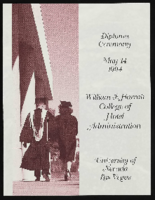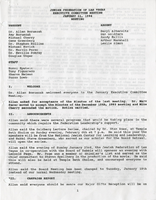Search the Special Collections and Archives Portal
Search Results
Phillip L. Cook oral history interview
Identifier
Abstract
Oral history interview with Phillip L. Cook conducted by Richard Strahan on March 3, 1977 for the Ralph Roske Oral History Project on Early Las Vegas. Cook first talks about his parents' move to Nevada and discusses how the school system has changed over time. He then describes the first businesses that opened up in the Downtown and Strip areas of Las Vegas, Nevada before discussing prostitution, Block 16, and recreational activities available to youth. Cook also talks about the first television sets and telephone systems made available, and he moves on to talk about the prices of things such as movies and haircuts when he was younger. The interview then moves to discussions on the Old Ranch, racial discrimination, school integration, the crime rate, and the school system in Las Vegas.
Archival Collection
University of Nevada, Las Vegas Arboretum Project Records
Identifier
Abstract
The University of Nevada, Las Vegas Arboretum Project Records are comprised of documents, brochures, and photographs dating from 1976 to 2012 documenting both the creation and operations of the Arboretum at the University of Nevada, Las Vegas (UNLV). The collection includes photographs of planning the Arboretum, the opening ceremony, and aerial photos of the UNLV campus. The brochures include guides to the Arboretum, lists of types of plants grown, and information on the Xeric Garden.
Archival Collection
Edwin "Tony" Wuehle oral history interview
Identifier
Abstract
Oral history interview with Edwin "Tony" Wuehle conducted by David Schwartz on December 21, 2006 for the Boyer Early Las Vegas Oral History Project. In this interview, Wuehle discusses his early life in Hettinger, North Dakota and his career as an educator. He recalls his first experiences playing poker, participating in home poker games while living in Michigan’s Upper Peninsula, and using a pseudonym as a player. Wuehle then talks about writing a book, founding the Gamblers Book Club Press in Las Vegas, Nevada, and writing for religious publications. Later, Wuehle explains the tension between participating in religion and playing poker. He describes Las Vegas poker rooms during the 1960s and 1970s and shares his thoughts on online poker. Lastly, Wuehle discusses why casinos use prop players and his efforts to organize a poker tournament to raise funds for Bay de Noc Community College in Michigan.
Archival Collection
Las Vegas Jazz Society Records
Identifier
Abstract
The Las Vegas Jazz Society Records (approximately 1975-2003) are comprised of organizational records including meeting agendas, minutes, and membership statistics of the Las Vegas Jazz Society (LVJS). Included in the collection are issues of the LVJS's newsletter Jazz Notes, promotional materials, blank membership applications, correspondence, information on other regional jazz societies, and photographic prints depicting various events and festivals. A portion of this collection documents LVJS's involvement in saving the KUNV 91.5 FM radio station.
Archival Collection
Elizabeth and Charles Pratt Personal Papers
Identifier
Abstract
The Elizabeth and Charles Pratt Personal Papers consist of correspondence, travel information, and photographs from the Pratt family dating from 1895 to 1953. The majority of correspondence in the collection is between Charles Pratt and his wife, Alice Elizabeth Margaret "Diane" Pratt. The collection also contains correspondence between Elizabeth Pratt's parents and her literary journals from her time attending Swarthmore College, in Swarthmore, Pennsylvania.
Archival Collection
Jonathan S. Sparer, FAIA oral history interview
Identifier
Abstract
Oral history interview with Jonathan S. "Jon" Sparer, FAIA conducted by Stefani Evans and Claytee D. White on August 29, 2016 for the Building Las Vegas Oral History Project. Sparer discusses his involvement in the Jewish, and LGBTQ+ communites, and his career as an architect in Las Vegas, Nevada. He also talks about working on projects that included The Mirage Hotel and Casino, the Congregation Ner Tamid, and The Center (The Gay and Lesbian Community Center of Southern Nevada).
Archival Collection

University of Nevada, Las Vegas (UNLV) William F. Harrah College of Hotel Administration Diploma Ceremony program
Date
Archival Collection
Description
Commencement program from University of Nevada, Las Vegas Commencement Programs and Graduation Lists (UA-00115).
Text

Transcript of interview with Ruth Gust by Beth Ann Bonenfant, March 10, 1981
Date
Archival Collection
Description
On March 10, 1981, Rebecca (Beth) Bonenfant interviewed Ruth Gust (born 1905 in Mokane, Missouri) about her life in Nevada. Gust first talks about her original move to Las Vegas in 1947 and some of the first businesses that existed at the time. In this brief interview, she also talks about the first casinos, the culinary union, her employment as a server, and Mt. Charleston.
Text

Paul Sogan interview, May 16, 1995: transcript
Date
Archival Collection
Description
Interviewer: Dennis McBride
Text

